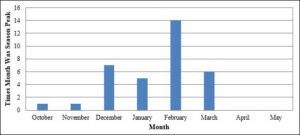
Contact our PIO directly to share health news.

770.339.4260
Flu: What you need to know

Flu is a viral illness that causes fever, sore throat, muscle aches and cough. Flu can weaken the body’s defenses and lead to complications like bacterial pneumonia. It can also worsen existing chronic health problems like heart disease and diabetes.
Flu season can be as early as October and as late as May. During an average flu season, more than 200,000 are hospitalized because of complications from flu. Some people, such as young children, the elderly, pregnant women and people with certain chronic health conditions are more likely to have complications related to flu.
The figure below, from the Centers for Disease Control and Prevention (CDC), shows peak flu activity for the United States by month for the 1982-1983 through 2015-2016 flu seasons. The “peak month of flu activity” is the month with the highest percentage of respiratory specimens testing positive for flu virus infection during that flu season.
During this 34-year period, flu activity most often peaked in February (14 seasons), followed by December (7 seasons), March (6 seasons), and January (5 seasons).
Peak Month of Flu Activity
1982-1983 through 2015-2016

Source: CDC
Who can get the flu?
Anyone!
During an average flu season, 10 to 20% of people are infected. Flu spreads easily from person to person when an infected person coughs or sneezes. Flu virus can also survive on surfaces outside the human body for hours. People can become infected by getting the virus on their hands, then rubbing their eyes or nose.
Healthy adults can spread the virus from one day before they have symptoms until five days after their beginning of symptoms. They can pass flu virus to others even before they feel sick. Flu viruses change every year, so immunity is not long-term.
What are symptoms of the flu?
Typical flu symptoms include:
- high fever
- cough
- sore throat
- runny or stuffy nose
- headache
- muscle aches
- extreme fatigue
Flu is different from a cold although the symptoms can overlap. In general, flu is worse than the common cold, and symptoms are more common and intense with flu. Colds are usually milder than the flu, and more likely to cause a runny or stuffy nose. People with flu usually recover completely in one to two weeks, but some people suffer severe complications. Colds generally do not result in serious health problems.
What are complications of the flu?
Complications of flu can include bacterial pneumonia, ear infections, sinus infections, dehydration, and worsening of chronic medical conditions, such as congestive heart failure, asthma, or diabetes. Hospitalization and death can result from flu infection complications.
Who should get a flu vaccine?
The “flu shot” is approved for people age 6 months and older, including healthy people and people with chronic health conditions. Anyone wanting to protect themselves against flu should consider getting vaccinated. Vaccination is recommended for most people, especially those most likely to experience complications of the flu and people who live with or care for people at highest risk.
Those at highest risk include:
- people 50 years and older;
- people who live in nursing homes and other long-term care facilities that house those with long-term illnesses;
- people with chronic health conditions;
- women who will be pregnant during the influenza season;
- children 6 months of age to 18 years of age.
People who live with or care for those at high risk for complications from influenza, including:
- household contacts of persons at high risk for complications from the flu;
- household contacts and out of home caregivers of children less than 6 months of age (these children are too young to be vaccinated);
- healthcare providers.
Where can I get a flu vaccine?
Visit any one of our Health Centers today to get your flu shot. No appointment necessary. Most major insurances accepted.
Visit our locations page to find a Health Center near you.
Additional Resources:
Everyday preventive actions that can help fight germs, like flu
Sources: Centers for Disease Control and Prevention (CDC), Georgia Department of Public Health
Contact our PIO directly to share health news.



